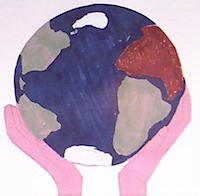The Global Thinking Project is a "hands across the globe" education project which provides a paradigm for students and teachers to participate in environmental study and to use new technology tools with peers around the world. During the course of the project, students learn to monitor and analyze important physical and biological aspects of their environment such as the environmental quality of their classroom, the quality of air and water in their community, as well as the study of solid waste, acid rain, tap water, and the creation of local community-based environmental topics. The skills and knowledge that students construct are then applied as students engage in collaborative learning projects that link classrooms globally. In so doing, students learn that problems that are typically addressed as science problems, have social, political, economic and ethical aspects, as well.
The GTP was implemented in more than 100 schools in seven countries including Australia, the Czech Republic, Singapore, Spain, Russia and the United States. Students in grades 5 - 12, in a variety of urban, rural and suburban regions participate in the project. Teachers are using GTP in a variety of settings, including the "regular" school curriculum, particularly in science and social studies classes, as after school or club activities, and also in community groups such as the Girl Scouts. Some schools have created a special course, called Global Thinking which is a required course in some schools, and an elective in others.
The GTP created cross-cultural teaching materials in the form of a book (Environmental Science on the Net: The Global Thinking Project) that has been field tested in more than one-hundred schools and with thousands of students over the past nine years. Teachers from several continents have participated in the writing of the materials, as well as in Summer teacher preparation institutes in Atlanta.

![]() The Roots of GTP
The Roots of GTP
The Global Thinking Project grew out of a series of trips to the (former) Soviet Union sponsored by the Association for Humanistic Psychology (AHP). With no official invitation, a group of 30 educators and psychologists visited Moscow, Leningrad (St. Petersburg), and Tbilisi (Georgia) for 17 days in September 1983. Rooted in the concern for the well-being of the planet, and for improving the relationships between the people of the United States and the Soviet Union, this delegation laid the groundwork for the development of the AHP Soviet Exchange Program. From this emerged the Global Thinking Project, dedicated to helping students learn to think globally by acting locally.
From 1983 to 1990, the AHP sponsored 12 delegations to the USSR, and received nearly a half-dozen delegations of Soviet colleagues. These exchanges fostered official agreements between the USSR Academy of Pedagogical Sciences (now the Russian Academy of Education) and the AHP that focused on humanistic and creative teaching methods, cooperative learning and teacher education. Through seminars, classroom visits, lab demonstrations, and other informal experiences, a powerful network was established. Georgia State University (GSU) emerged as the focal point for the AHP's educational activities with Academy of Pedagogical Sciences. An international conference on Soviet and American education led to an agreement between GSU and the APS that was signed in Moscow in May of 1989. Both parties agreed to collaborate to develop strategies, methods, and teaching materials to help students think globally. It was agreed, given the present state of the world, to develop teaching materials that would:
- Empower students and teachers to get involved with important global problems and concerns.
- Introduce students to collaborative methods and strategies of inquiry that can be used to solve problems locally, and provide the knowledge and technological means needed to deal with problems globally.
- Develop computer literacy in students that will allow them to use microcomputers as a telecommunications tool to collaborate with counterparts in other nations.


